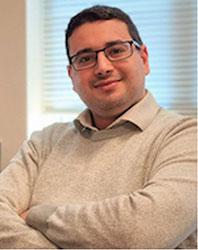The Amaranth Diabetes Foundation, Inc. is an integral part of the global effort to stop the spread of diabetes. The Foundation Board selects the American Diabetes Association®—sponsored research projects conducted by the following scientists:
Judith Agudo, PhD
Dana-Farber Cancer Institute

Harnessing immune privilege mechanisms from stem cells to protect beta-cells from immune attack
The goal of this project is to develop strategies to ensure the survival of transplanted or regenerated beta-cells, by allowing them to effectively and safely cloak from immune cells. (Grant funded through 6/30/2025)
Anas El Fathi, PhD
The Rector and Visitors of the University of Virginia

Facilitating diabetes management with an AI-personalized carbohydrate-free bolus calculator for smart insulin pens
Most patients with type 1 diabetes use multiple daily injections of insulin to treat this disease. They need to self-administer, usually using an insulin pen, an insulin dose before consuming their meals. Patients calculate mealtime insulin dose to cover meal-nutrients, principally, carbohydrates. However, this is a challenging task that requires education in carbohydrate counting and good numeracy skills. This is particularly problematic for patients using insulin pens because of the lack of a built-in bolus calculator. The new generation of insulin pens, called smart insulin pens, can connect with smartphones and use a bolus calculator. Still, the existing bolus calculators are not designed for this population. (Grant funded through 3/31/2024)
Howard William Davidson, PhD
University of Colorado Denver

A high throughput test predicting future beta cell loss in subjects with recent onset T1D
The rate at which insulin producing cells are lost (progression) in someone with type 1 diabetes varies considerably between individuals. This makes it difficult to accurately determine if someone has actually benefitted from treatment with an experimental drug in a clinical trial; naturally slow progressors can be mistaken for “responders,” while slowed progression (and benefit) in someone who would otherwise be a fast progressor may be missed. As proteins and genes provide complementary information, we believe that testing both together will provide a much more accurate and precise test and overcome the limitations of those currently available. (Grant partially funded through 6/30/2025)
William Gee Chang, MD, PhD
Yale University School of Medicine

Micro vessels-on-a-chip to model diabetic microangiopathy and to advance precision medicine in diabetes
Diabetes results in hyperglycemia that damages micro vessels throughout the body. This is known as diabetic microangiopathy and can lead to dysfunction of multiple organs including the brain, eyes, heart, kidneys, and nerves. This study will increase understanding of the biological processes driving diabetic small vessel disease, generate new biomarkers to track disease, and establish a platform to potentially test new therapeutics. (Grant funded through June 30, 2025)